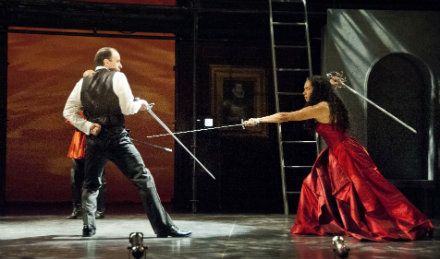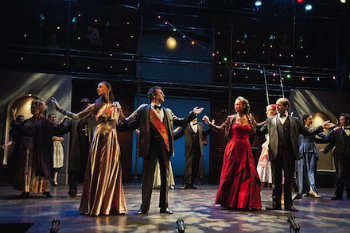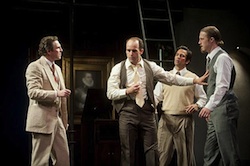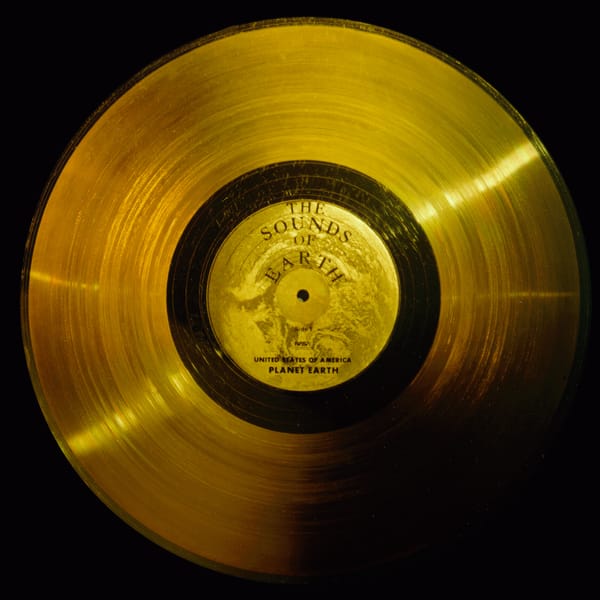
Photos by Kevin SpragueBy Jeremy D. Goodwin Near the top of Shakespeare & Company's stylish, urbane production of Love's Labour’s Lost, a mysterious warrior goddess enters a king's richly appointed study, cueing an enchanting, slow-motion sword fight. (Susan Dibble and Edgar Landa are the movement/dance and fight choreographers, respectively.) The altercation hints at the wars (of wit and public policy) between the sexes to come in the play, and also nods toward a metaphorical transcendence this production never again aims to reach. So, too, the cleverly lain overtures at contemporary resonance — a pre-recorded curtain speech alluding to the recent NSA surveillance kerfuffle, a radio news report referring to the "refugee camps" to which the king has consigned the women of his court — gently fall away once the play gallops merrily into its series of mis-delivered letters and misguided stabs at courtship. It's almost as if director Lisa Wolpe set out for a much more richly layered interpretation, but then said: Meh, let's just have fun. Still, like the many other things to admire in this production, it's all evidence of a creative team seeking to transcend the limitations of its problematic material, and succeeding.

Love's Labour's Lost is one of the Bard's early comedies, and although there's plenty of good stuff going on — including a self-awareness we'd today term metafictional, and an infatuation with language and rhyme, if not beautiful poetry — the play also serves as a training ground for ideas that Shakespeare would give fuller airings down the line. So the commoners enacting the Masque of the Nine Worthies are second-rate Rude Mechanicals; Don Armado, played here with straight-faced pomposity by Edgar Landa, is a rough sketch of Paroles (from All’s Well That Ends Well) whose main job is to talk in a funny accent, so Shakespeare's audience could lord it over the Spanish; the bumbling Boyet is rendered here as vividly as possible by the deft clowning of Michael Toomey, but in the end he is a slight figure in Shakespeare's gallery of fools. So it's a play of mild pleasures. But Wolpe and her team milk every ounce of joy embedded in its verse, and turn out a swiftly paced exercise in light, summer comedy. The fact that these able artists transform the 16th century verse into such a pleasant, non-taxing evening at the theatre is, of course, its own kind of victory. Wolpe places the story in the late 1940's, with Jason Asprey's nameless King reacting to the carnage of World War II by a declaring a three-year period of monkish study for he and his lords, forswearing the company of women. This proves rather inconvenient, as the Princess of France (played fetchingly in the company debut of Brooke Parks, an Oregon Shakespeare Festival alum) is due to show up any minute for a state visit, along with a bunch of single ladies who may or may not want to put a ring on it. The proceeding rationalizations of the King and his men, as they seek legalistic means of violating the spirit of their oaths but not the letter, serves as a send-up of scholarly, chin-stroking wags everywhere.

The king and his followers, seen here (from left to right) in a photo by Kevin Sprague — Berowne (realized with impish glee by the excellent Mark Bedard, another Oregon import also making his Lenox debut), Dumaine (suavely played by the debonair David Joseph) and Longaville (embodied a bit severely by Andy Talen)— are dressed smartly by costume designer Govane Lohbauer in dark suits and bow ties for most of the evening, while Junghyun Georgia Lee's very effective set transforms from the book-laden study of an English mansion into the hardscabble camp where the Princess and her ladies are forced to lodge. Beyond the hip concept and stylish design elements, the real news here is Bedard, who plays Berowne as a rakish but (mostly) harmless scoundrel, well-used to the affections of women, whose attempts to undermine his King's plans are sprung not of malevolence, but his gut instinct that what the post-war world needs is a Baby Boom, not enforced abstinence.

The team hits a few odd notes. Asprey plays his role as an infirm, dottering regent, which makes his courtship of the fresh-faced Princess (seem at left with Nafeesa Monroe's Rosaline) feel creepy. Ryan Winkles and Josh McCabe, who’ve emerged in recent years as perhaps the company’s finest comedic team, are much appreciated but feel underused in their roles as Dull and Sir Nathaniel. But if the play as written denies us the spree of happy coupling we expect from such fare — as Berowne famously summarizes at the end, “Jack hath not Jill" — this production does all it can to make sure we enjoy the journey. In the end, the labor feels well spent. Love's Labour's Lost Shakespeare & Company's Tina Packer Playhouse Through September 1








